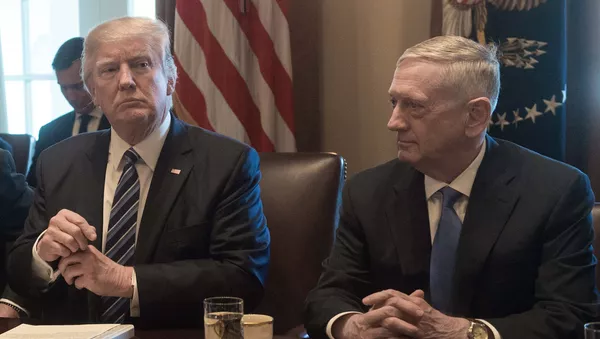But how much credit should the US military really claim for the defeat of the despised militant group?
Brian Becker and John Kiriakou of Radio Sputnik's Loud & Clear spoke to Press TV war correspondent Ali Musawi and journalist Joe Lauria to discuss Trump's left-field proclamation.
"It's kind of funny how he's trying to take so much credit for the defeats of [Daesh] in both Iraq and Syria," said Musawi. "The US did play a part, especially on the Iraqi side, but they were not the main players to defeat [Daesh] in those two countries. The credit has to solely go to the Iraqi forces and the Syrian forces: they led the war against [Daesh], they were the ones who were at the main frontlines, they took all the strategic areas from the terrorists, and they were the ones who sacrificed the most to defeat [Daesh] in both countries."
"I'm not sure where Trump is coming up with this, where he's congratulating himself for a move that was actually set up by the last president, Barack Obama," he added. "He basically just continued the same policies that Obama started against [Daesh] with the US-led [anti-Daesh] coalition, only a bit more aggressively than Obama did."
Lauria pointed out that the wars against Daesh in Iraq and Syria were related, but far from the same conflict. They were fought by different factions for different territories, and it's reductive to refer to them as one overarching struggle.
Musawi agreed, adding that the struggle against Daesh was even treated as two distinct wars by mainstream Western media."The wars in both Syria and Iraq were definitely different: when the US attacked a side in Iraq, the mainstream media did not report it as such, as attacks against civilians. They said that this is an attack against [Daesh] and that has to be done — but whenever the Syrian army or the Syrian government did the same, it was a totally different story."
"So those two have been separate wars in the media, but on the ground, from what we have seen from both the Syrian and the Iraqi sides, is that they are fighting a war against extremist militants. They sometimes viewed the war in the same manner, and that's what allowed both the Syrian side and the Iraqi side to manage and defeat the extremists in both countries."
To Musawi, the US played a much larger role in creating Daesh than they did to destroy it. "One of the main reason that there was such support for militants such as al-Qaeda that led to the creation of Daesh was to destroy the influence that Iran has been given in the region," he said. "This is also thanks to the blunders of the US in the region itself after they invaded Iraq and destroyed the infrastructure there to build a country and then left it for dead in 2011. Obviously, we saw that Daesh came in [and was] fought by Iraqi paramilitary forces, which are mainly from the Shia population, and most of them are allied with Iran."
"Now US rivals and enemies in the region, like Russia, have more influence in the region than ever before. We also have seen Iran's influence growing, and Iraq and Syria as well through Hezbollah and Lebanon. While they will not admit that it was thanks to Hezbollah and Russia for the defeat of Daesh, people in most of these countries know it. "






